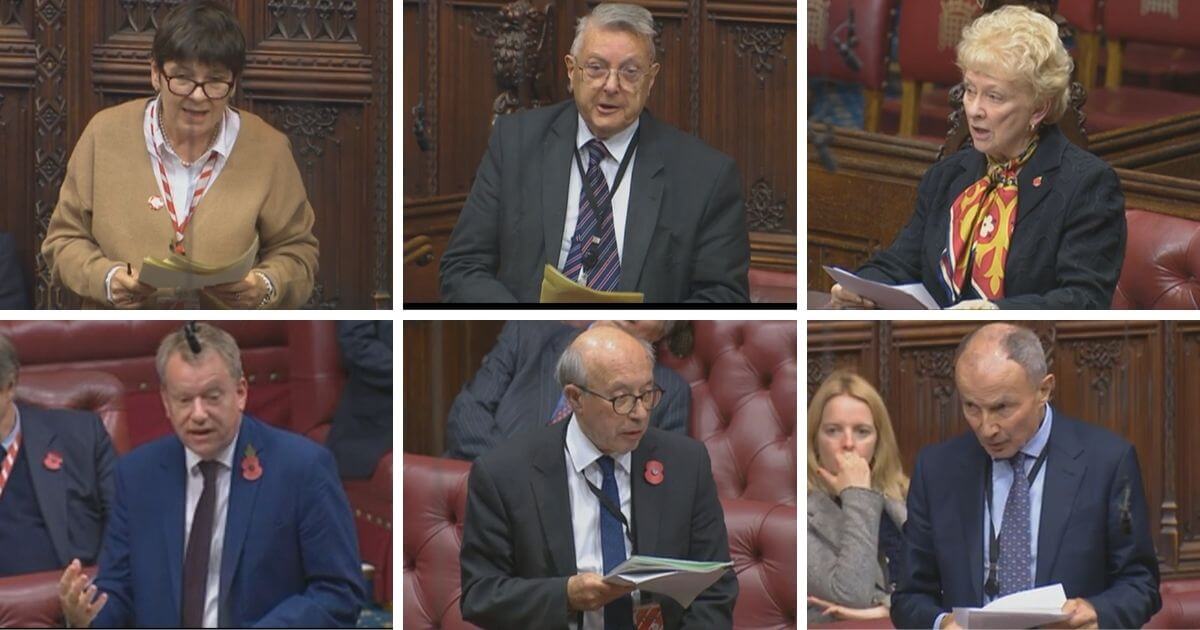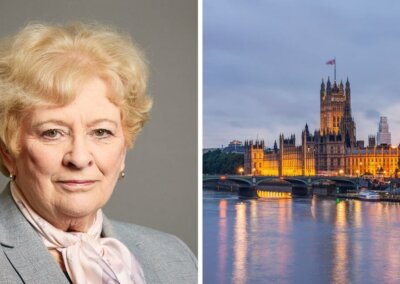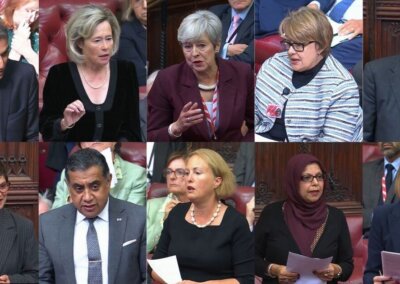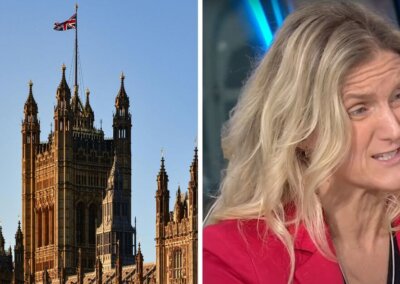A cross-party lineup of Peers has spoken out against introducing nationwide buffer zones during the Second Reading debate of the Public Order Bill which took place in the House of Lords this evening.
On 18 October MPs voted in support of an amendment to the Public Order Bill to introduce ‘buffer zones’ around abortion clinics nationwide. These zones would ban offers of help and alternatives to abortion.
The Bill has now progressed to the House of Lords where there was strong opposition to the abortion buffer zones clause (Clause 9) from a number of Peers.
“I support the right to protest for all, not just the protestors I admire, but those I despise as well”.
Baroness Fox, who made it clear in her speech that she is a “long-standing pro-choice campaigner” spoke firmly against the abortion buffer zone clause in the Public Order Bill.
She highlighted that the buffer zone clause “criminalises and bans…‘seeking to influence, advising or persuading, attempting to advise or persuade or otherwise expressing an opinion’.
Emphasising that she did not take a pro-life position on the abortion issue, she said, “Many of us may feel little sympathy with people who are viewed as anti-abortion cranks, but as Big Brother Watch notes, this sets a precedent that will inevitably lead to attempts to prevent speech, expression, information sharing, and assembly in relation to other controversial and popular causes”.
She then concluded that she supported “the right to protest for all, not just the protestors I admire, but those I despise as well.”
Liberal Democrat Peer, Lord Beith, said that he had concerns with some “protest tactics” that took place outside abortion clinics, but outlined that he “cannot support a clause which criminalises a person who ‘seeks to influence, provides information, or expresses opinion’.
“This is the most profound restriction on free speech I have ever seen in any UK legislation and I could not support it if it remains in its present form.”
Former Government minister and Brexit negotiator, Lord Frost, voiced similar concerns with parts of the buffer zone clause, saying “I don’t think it can be right for this Parliament to make it illegal for example to quote ‘seek to influence’ in subclause A, or ‘persistently occupy’ in clause B, or ‘inform or attempt to inform’ in clause E. And that is true whether it is in the vicinity of an abortion clinic or anywhere else”.
“The most significant shift away from English law’s presumption of individual liberty and freedom of expression”.
In one of the most scathing contributions on the buffer zone clause in the Bill, Lord Farmer said: “If passed into law, Clause 9 would mark the most significant shift away form English law’s presumption of individual liberty and freedom of expression in the interest of ruthlessly censoring pro-life views”.
He also pointed out what he said was the “hypocrisy” of MPs who voted to ban pro-life vigils, but then voted against the Bill as a whole.
“My main concern with this Bill is the ideologically inspired clause nine, which has just been spoken about. Introduced as an opposition party amendment in the other place, of those who voted, all Labour MPs registered their support for the right to protest disruptively by voting against this Bill at Second Reading and also all voted for pro-life protestors’ rights to be withdrawn. This is not just hypocritical, it exposes the cultural authoritarianism behind those who claim to want the freedom to protest.”
Former Police Ombudsman, Baroness O’Loan, was also highly critical of the buffer zone clause in the Bill saying “A blanket ban around abortion clinics my Lords would be disproportionate, it would be a denial of the right to the freedom of expression, it is unnecessary and it could even be harmful.”
The Bishop of St Albans outlined that he has serious concerns with the clause: “The wording ‘interferes with’ is so broadly defined it includes seeking to influence, merely expressing an opinion or attempting to inform about abortion services. I cannot believe this is proportionate given the existing powers possessed by the police and local authorities, and I am sure that those of us from this bench will wish to look again at this clause as it comes back to us.”
Lord Hope emphasised the importance of balancing the interests of women in obtaining an abortion without intimidation and the rights to freedom of expression and freedom of assembly exercised by those who “object to the process.” He acknowledged that buffer zones “could offer a solution” but that the House of Lords would “need to consider carefully whether the detail in Clause 9 is a proportionate response to the undoubted and serious problems that it seeks to address.”
Labour Peer, Lord McAvoy, shared the personal testimony of a woman who had been helped by pro-life volunteers outside an abortion clinic. He asked the chamber, “Are those in support of this clause really in favour of criminalising people who seek to help women with housing, protection from domestic abuse, the provision of clothing or a variety of other financial and legal support?”
He then went on to highlight the wide-ranging consequences of setting the precedence that the buffer zone clause would set.
“My Lords, we cannot start using blunt instruments such as this clause to criminalise innocent volunteers. If we make it illegal to hand out a leaflet with offers of housing or support, we embark on a slippery slope that could lead to bans on other leaflets with which we disagree.”
Home Office Minister Lord Sharpe closed the debate by stating that the buffer zone clause is not a proportionate response to any issues that have arisen from pro-life vigils taking place outside abortion clinics, is not human rights compliant and would have to be redrafted.
The Government is expected to bring forward a new version of the clause at either Committee or Report Stage of the Bill.
Right To Life UK spokesperson Catherine Robinson said: “Tonight, Peers from a number of different parties and different viewpoints on the wider issue of abortion have lined up to highlight a series of serious issues with introducing buffer zones around abortion clinics nationwide”.
“Hundreds of women have been helped outside abortion clinics by pro-life volunteers who have provided them with practical support, which made it clear to them that they had another option other than going through with the abortion”.
As has been pointed out many times, there are laws in place to prevent harassment and intimidation and these should be enforced if and when necessary. There is no need for further draconian legislation”.












